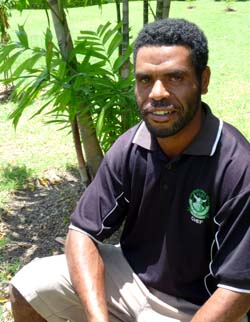AN OPEN LETTER
To PNG Prime Minister, The Honourable Peter O’Neill and
Australian Prime Minister, The Honourable Julia Gillard
Please reinstate the PNG-Australia Policing Initiative and create a police academy in PNG.
Last week’s murder of student Rex John at Laloki on the outskirts of Port Moresby is a wake-up call for PNG and Australian leaders.
It highlights the urgent need for the reinstatement of the PNG-Australia policing initiative (under which Australian police helped their PNG counterparts with training, mentoring and the creation of structures for governance).
Rex was travelling to Moresby last Monday to collect his academic gown for his graduation the following weekend as a Community Health Worker. A gang of cowardly thugs attacked his bus, bashing and stabbing the passengers with bush knives and machetes. Rex died of his wounds that evening.
Rex John’s needless death robbed his father and nine brothers and sisters of a loving son and brother. It deprived his village of Naduri of Rex’s hard-won skills as their first-ever Community Health Worker. And it denied PNG the benefits of a fine young man who hoped to serve his nation in the same timeless, selfless tradition of the revered Fuzzy Wuzzy Angels.
Rex had showed the way to a better future for his nation. He was one of those quiet achievers who are the essential foundations of a healthy and sustainable society. Rex was one of the 1 out of 100 kids who start school in PNG and who make it through to Year 10. He was one of the even smaller group who make it through to tertiary studies. Rather than being motivated by making money or becoming a Big Man in politics, Rex was determined to help his family, his community and his country by serving them as a qualified Community Health Worker.
Rex had done all the hard work. He had won a scholarship with the Kokoda Track Foundation, studied diligently and had passed his exams. He was looking forward to his graduation last weekend and to being posted back to his village of Naduri, bringing, for the first time, desperately-need medical skills to the community he loved.
PNG’s ‘Vision 2050’ Plan targets seven ‘key outcomes’. One of them is improved law and order: “Improving the law and order situation is essential to laying the foundations for socioeconomic growth and establishing investor confidence. Adequate budgetary allocations to the RPNGC [Royal Papua New Guinea Constabulary] and the broader law and justice sector is necessary to combat law and order problems.
Last year’s Australia-PNG Ministerial Forum recognised that … “Deterioration of law and order hinders development and disrupts delivery of government services and business. It inhibits the effectiveness of development assistance; it has a serious negative impact on investor confidence and on the quality of life of individuals.”
Prime Ministers, it is time for decisive leadership. It is time for a positive response to the growing levels of violence.
PNG’s leaders must act immediately to bring Rex John’s killers to justice and they must redouble their efforts to fight against the violence that dishonours their capital city. For, until Papuan New Guineans can walk the streets of their capital without fear, PNG’s leaders cannot hold their heads high.
Australia’s leaders must also act to help our nearest neighbour to combat the deleterious effects of the violence plaguing Moresby and other PNG cities. For it is to our lasting shame that no two neighbouring nations in the world have a greater disparity in poverty and wealth (as measured by the U.N. Human Development Index) than Australia and PNG.
Please join together to reinstate the PNG-Australia Police Initiative as a matter of urgency to prevent the loss of any more precious lives like Rex John.
Patrick Lindsay, Chairman, Kokoda Track Foundation
 Friday, November 30, 2012 at 8:10AM
Friday, November 30, 2012 at 8:10AM 